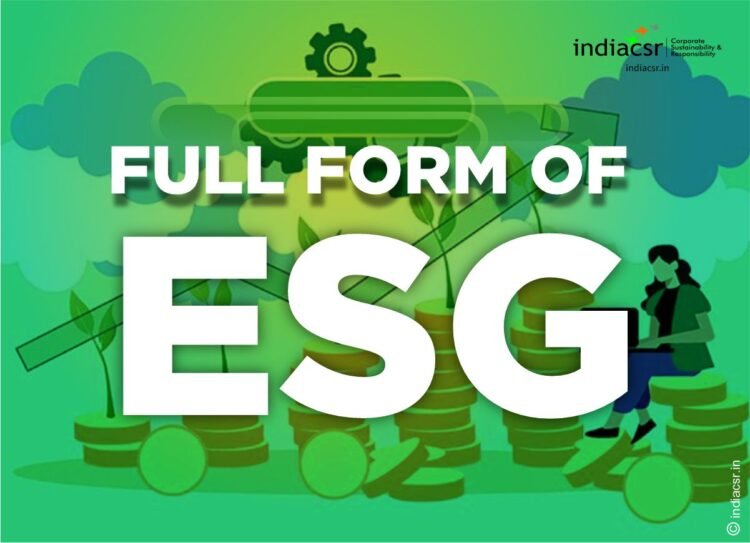ESG is an acronym or Short Form for Environmental, Social, and Governance.
The full form of ESG is – Environmental, Social, and Governance (ESG). The term ESG is becoming popular in India and developing economies.
The business term promotes a comprehensive understanding of sustainability, implying that it goes beyond just environmental concerns.
ESG is an acronym for Environmental, Social, and Governance. ESG is a robust framework that offers stakeholders insights into how an organization navigates challenges and prospects associated with environmental, social, and governance parameters – often referred to as ESG elements.
ESG’s tripartite structure comprises
Environmental: These aspects encompass climate change, pollution, and resource utilization.
Social: These aspects focus on employee relations, human rights, and societal impact.
Governance: These aspects address issues like board supervision, executive remuneration, and shareholder privileges.
The surge of ESG investing mirrors the growing inclination of investors towards aligning their investment strategies with their ethical values and safeguarding against potential risks tied to climate change and other sustainability matters. Moreover, ESG investing aids in avoiding exposure to companies involved in precarious or unprincipled operations.
Investment opportunities in the ESG domain are vast. Some investors opt for ESG funds – a mix of mutual funds or exchange-traded funds that sieve companies conforming to specific ESG standards. Others prefer investing directly in individual stocks of companies deemed as ESG front-runners.
The landscape of ESG investing is intricate and continuously evolving. No universal approach fits all in ESG investing, underscoring the need for investors to evaluate their unique requirements and objectives meticulously before making any investment moves.
Key Points
ESG stands for Environmental, Social, and Governance.
ESG is a framework for evaluating the sustainability and ethical impact of an investment.
ESG factors can include things like a company’s environmental impact, its social responsibility, and its corporate governance practices.
What is the role of SEBI in promoting ESG investing in India?
SEBI is the Securities and Exchange Board of India. It is the regulatory body for the securities market in India. SEBI has played a key role in promoting ESG investing in India. In 2021, SEBI introduced a regulatory framework for ESG disclosures, ratings, and investing. This framework is designed to help investors make more informed decisions about their investments and to promote sustainable investing in India.
What are the key features of the SEBI ESG framework?
The key features of the SEBI ESG framework include:
- Mandatory ESG disclosures for listed companies.
- Regulation of ESG rating agencies.
- Promotion of ESG investing through mutual funds and other investment products.
The SEBI ESG framework is a significant step forward for sustainable investing in India. It will help to improve the transparency and accountability of companies, and it will make it easier for investors to invest in companies that are committed to sustainability.
What are the benefits of ESG investing?
Here are some of the benefits of ESG investing:
It can help to reduce risk. Companies that are committed to sustainability are less likely to be exposed to environmental and social risks.
It can improve performance. Companies that are committed to sustainability are often more innovative and efficient.
It can attract new customers and investors. More and more people are interested in investing in companies that are making a positive impact on the world.
If you are interested in ESG investing, there are a number of ways to get started. You can invest in ESG mutual funds, exchange-traded funds (ETFs), or individual stocks. You can also choose to invest in companies that have been certified as sustainable by a third-party organization.
ESG investing is a growing trend, and it is a great way to make a positive impact on the world while also protecting your financial future.







